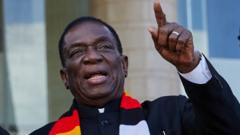As protests loom due to dissatisfaction with his leadership, Zimbabwean President Emmerson Mnangagwa has moved to strengthen his military support by appointing Emmanuel Matatu as the new army chief. The leadership shift occurs amidst internal party dissent and calls for the president to resign.
Zimbabwe's President Appoints New Army Chief Amid Rising Tensions

Zimbabwe's President Appoints New Army Chief Amid Rising Tensions
Emmerson Mnangagwa names Emmanuel Matatu as the new army chief ahead of imminent protests in Zimbabwe.
In a strategic maneuver ahead of planned protests on Monday, President Mnangagwa has appointed Emmanuel Matatu, a former major general, as the new chief of the army. This appointment follows significant unrest among a faction of war veterans who are demanding the president's resignation, citing issues of corruption and mismanagement.
The new army chief, 72, is hailed for his historical involvement in the liberation wars that shape Zimbabwean politics today. Matatu's immediate transition follows the abrupt retirement of former Army Chief Lt. Gen. Anselem Sanyatwe, who has now been assigned to the ministry of sports, arts, and culture. Mnangagwa's quick decision signifies a need to consolidate military loyalty ahead of the anticipated protests led by veterans who are also vying for Vice President Constantino Chiwenga to assume control.
Matatu's ties to the current head of the Zimbabwe Defence Forces (ZDF), Philip Valerio Sibanda, known for his unwavering support, suggest a strategic alignment that could bolster Mnangagwa's position. The ZDF, once led by Chiwenga, plays a crucial role in the power dynamics in the country.
As unrest has grown, with hints of Mnangagwa potentially extending his tenure, many party members echo sentiments of distrust in his leadership. The possibility of protests has prompted law enforcement to issue warnings against violence, implementing a four-day ban on carrying weapons in the capital. Consequently, the government’s internal strife hints at a challenging future for the president, who has earned the moniker "The Crocodile" due to his controversial political maneuvers.
While public sentiment towards the protests remains uncertain, recent actions and statements indicate that the leadership landscape in Zimbabwe is shifting rapidly amid a backdrop of escalating tensions.
The new army chief, 72, is hailed for his historical involvement in the liberation wars that shape Zimbabwean politics today. Matatu's immediate transition follows the abrupt retirement of former Army Chief Lt. Gen. Anselem Sanyatwe, who has now been assigned to the ministry of sports, arts, and culture. Mnangagwa's quick decision signifies a need to consolidate military loyalty ahead of the anticipated protests led by veterans who are also vying for Vice President Constantino Chiwenga to assume control.
Matatu's ties to the current head of the Zimbabwe Defence Forces (ZDF), Philip Valerio Sibanda, known for his unwavering support, suggest a strategic alignment that could bolster Mnangagwa's position. The ZDF, once led by Chiwenga, plays a crucial role in the power dynamics in the country.
As unrest has grown, with hints of Mnangagwa potentially extending his tenure, many party members echo sentiments of distrust in his leadership. The possibility of protests has prompted law enforcement to issue warnings against violence, implementing a four-day ban on carrying weapons in the capital. Consequently, the government’s internal strife hints at a challenging future for the president, who has earned the moniker "The Crocodile" due to his controversial political maneuvers.
While public sentiment towards the protests remains uncertain, recent actions and statements indicate that the leadership landscape in Zimbabwe is shifting rapidly amid a backdrop of escalating tensions.



















